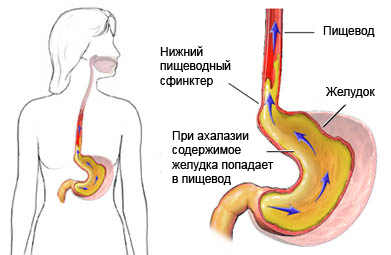Barrett's esophagus – Barrett Syndrome
Description of Barrett's esophagus
Barrett's esophagus is a complication of chronic esophagitis, which is inflammation of the esophagus.
Barrett's esophagus is characterized by changing cells, lining the esophagus. Normal cells have a flat shape (ploskokletochnuju), and Barrett's esophagus cells are shaped like columns. This change of cells called metaplaziej. This predrakovaja phase, which if untreated can lead to cancer of the esophagus.

Causes of Barrett's esophagus
The exact cause of Barrett's esophagus is unknown. Nonetheless, disease can occur as a result of damage to the esophagus, caused by chronic reflux of stomach acid. Frequent or chronic reflux of stomach acid into the esophagus is called gastroesophageal reflux disease or GERD.
Risk factors
Factors, increase the likelihood of Barrett's esophagus:
- Chronic heartburn;
- History Of GERD;
- Age: 50 and older;
- Paul: male;
- Hiatal hernia;
- Unhealthy food.
Symptoms of Barrett's esophagus
Although Barrett's esophagus not directly causes symptoms, in people with GERD may occur following:
- Heartburn;
- Chest pain;
- Nausea and vomiting;
- Blood in the vomit or stool;
- Sore throat or a chronic cough;
- Hoarse voice;
- Sour taste in mouth (acid reflux);
- Shortness of breath or wheezing;
- Difficulty or pain when swallowing (dysphagia).
Diagnosis of Barrett's esophagus
The doctor asks about the symptoms and medical history, and performs a physical exam. Tests may include:
- Biopsy – remove the sample tissue from the esophagus during endoscopy, to check for cancer cells;
- Endoscopy – a thin tube is inserted into the throat to examine the esophagus.
Treatment of Barrett's esophagus
After changing the cells as a result of Barrett's esophagus, they acquire a permanent character. The goal of treatment is to prevent further damage by stopping acid reflux from the stomach. Treatment may include:
Medication
Can be assigned to the following types of medicines:
- H 2-blockers, such as:
- Cimetidine;
- Ranitidine;
- Famotidin;
- Nizatidin;
- Proton pump inhibitors, such as:
- Omeprazole;
- Lansoprazole;
- Pantoprazole;
- Rabeprazole.
Operation
If the disease has acquired severe form or treatment medications failed, your doctor may recommend surgery. Her options may include:
- Fundoplikaciâ – the upper part of the stomach is wrapped around the esophagus; This is done in order to further reduce damage, caused by GERD;
- Delete a segment Barrett's esophagus;
- Removing the abnormal lining several methods – Photodynamic therapy, Argon plasma coagulation, multipolar electrocoagulation, using laser, cryotherapy and radiofrequency ablation.
Monitoring
A doctor may recommend endoscopy every 1-3 year for esophageal control on early signs of cancer. This recommendation must be individual for each person.
Prevention of Barrett's esophagus
The best way to prevent Barrett's esophagus – minimize and/or treat the reflux of stomach acid into the esophagus, which is usually associated with Gerd. In addition to medication or surgery, measures for preventing GERD include:
- We need to quit smoking;
- If there are overweight, You need to lose weight;
- Need to sleep on a pillow;
- You should avoid clothing with tight belts or belt;
- You want to avoid products, that cause heartburn. These include alcohol, caffeinated drinks, chocolate and products, oily, acute, sour (eg, citrus fruit or tomatoes) food;
- You need to eat smaller portions 4-6 in a day;
- It is not recommended to eat and drink during 3-4 hours, before you go to sleep.
